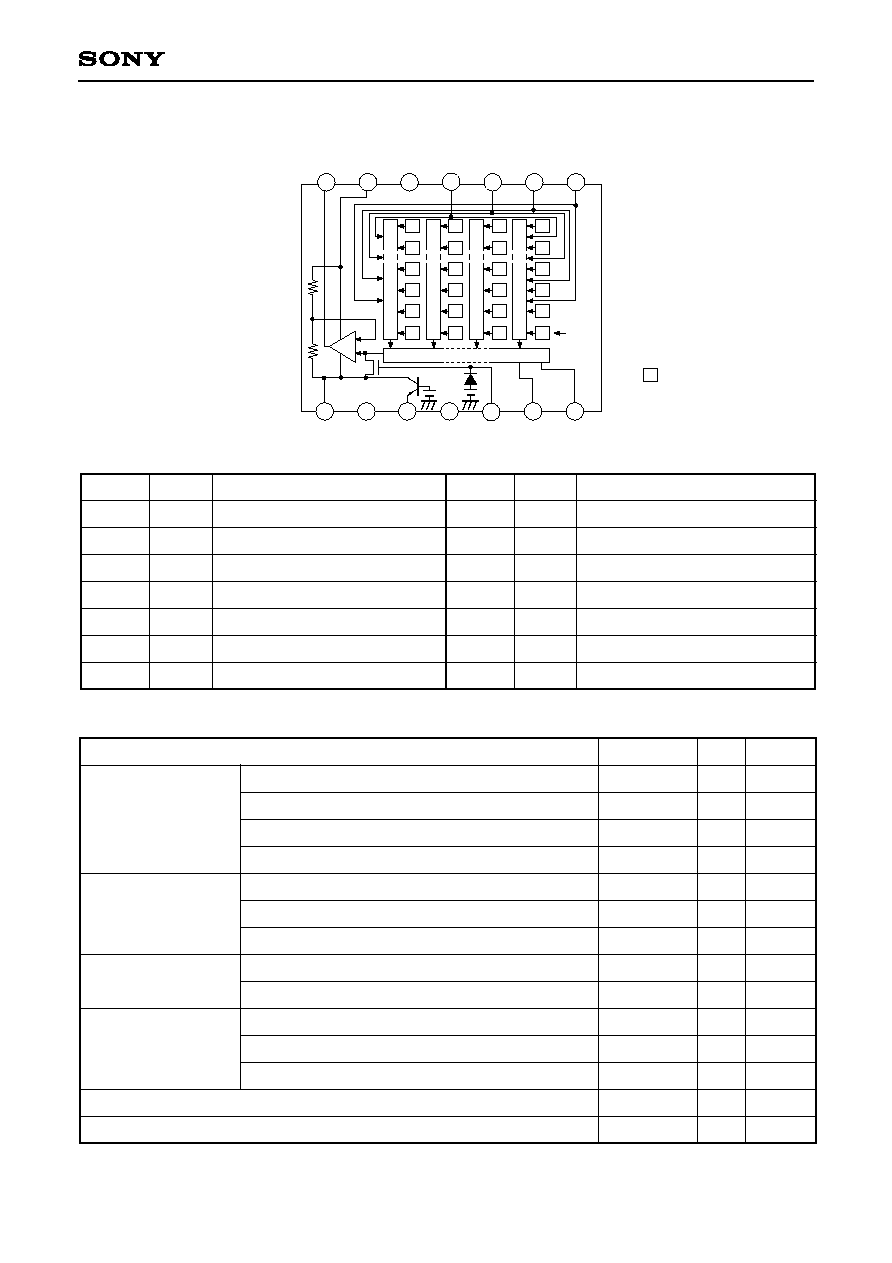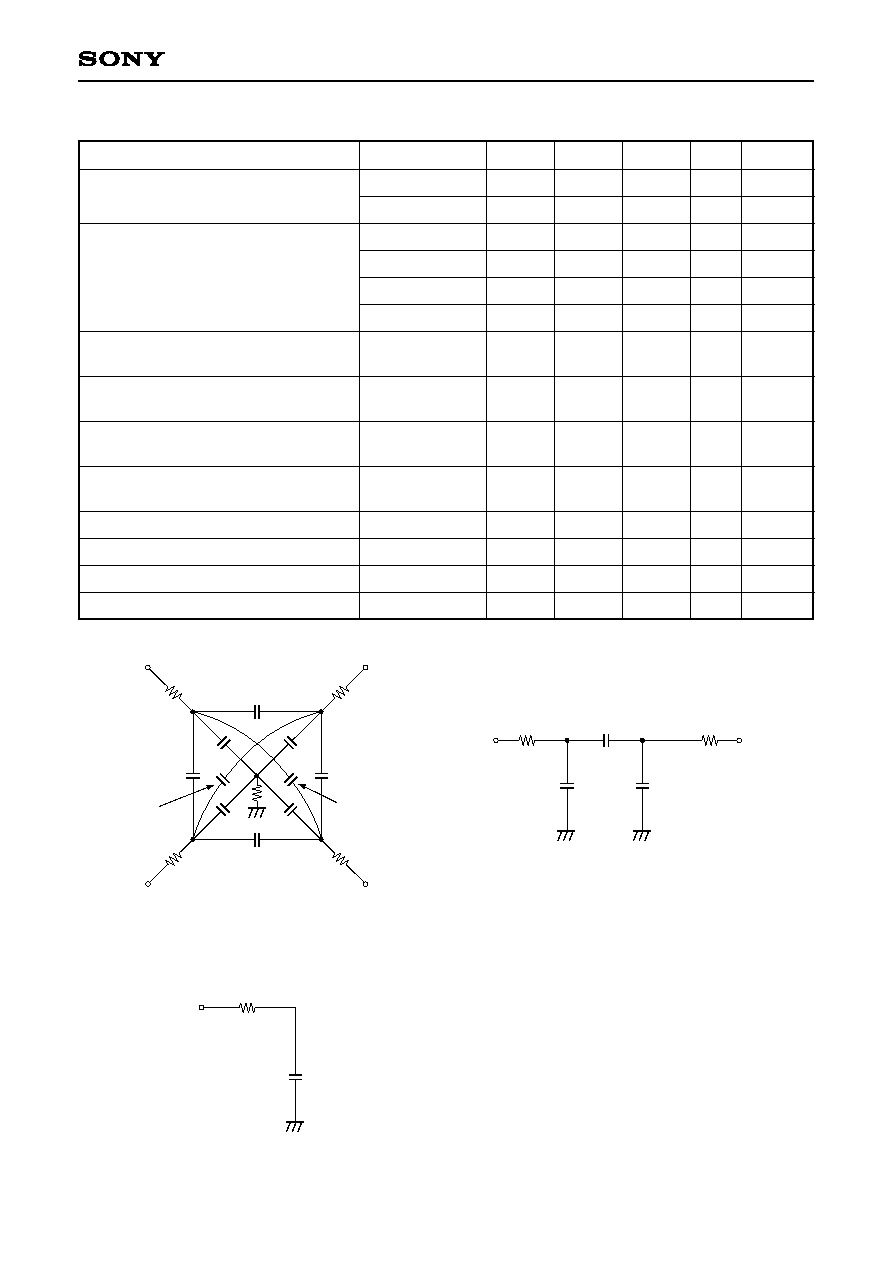
Description
The ICX226AK is an interline CCD solid-state image
sensor suitable for NTSC color video cameras.
Compared with the current product ICX206AK, smear
charactristics are improved drastically and power
consumption is reduced. Ye, Cy, Mg, and G
complementary color mosaic filters are used. High
sensitivity and high saturation signal are achieved by
Super HAD CCD technology.
This chip features a field period readout system and
an electronic shutter with variable charge-storage
time.
The package is a 10mm-square 14-pin DIP (Plastic).
Features
∑ Low smear (≠105dB Typ. at F5.6)
∑ Low power consumption
(≠34% compared with ICX206AK)
∑ High sensitivity
(+2.5dB at F1.2 compared with ICX206AK)
∑ High saturation signal
∑ Supply voltage
12V
∑ Horizontal register:
3.3V drive
∑ Reset gate:
3.3V drive
∑ No voltage adjustment
(Reset gate and substrate bias are not adjusted.)
∑ Low dark current
∑ Excellent antiblooming characteristics
∑ Continuous variable-speed shutter
∑ Recommended range of exit pupil distance: ≠20 to ≠100mm
∑ Ye, Cy, Mg, and G complementary color mosaic filters on chip
Device Structure
∑ Interline CCD image sensor
∑ Image size:
Diagonal 4.5mm (Type 1/4)
∑ Number of effective pixels:
510 (H)
◊
492 (V) approx. 250K pixels
∑ Total number of pixels:
537 (H)
◊
505 (V) approx. 270K pixels
∑ Chip size:
4.34mm (H)
◊
3.69mm (V)
∑ Unit cell size:
7.15µm (H)
◊
5.55µm (V)
∑ Optical black:
Horizontal (H) direction: Front 2 pixels, rear 25 pixels
Vertical (V) direction:
Front 12 pixels, rear 1 pixel
∑ Number of dummy bits:
Horizontal 16
Vertical 1 (even fields only)
∑ Substrate material:
Silicon
≠ 1 ≠
ICX226AK
E99911-PS
Diagonal 4.5mm (Type 1/4) CCD Image Sensor for NTSC Color Video Cameras
Sony reserves the right to change products and specifications without prior notice. This information does not convey any license by
any implication or otherwise under any patents or other right. Application circuits shown, if any, are typical examples illustrating the
operation of the devices. Sony cannot assume responsibility for any problems arising out of the use of these circuits.
Optical black position
(Top View)
14 pin DIP (Plastic)
Pin 1
V
2
25
1
12
Pin 8
H

≠ 2 ≠
ICX226AK
5
6
7
9
10
11
13
Note)
Note) : Photo sensor
V
O
U
T
G
N
D
V
1
V
2
V
3
V
4
V
D
D
G
N
D
S
U
B
V
L
R
G
H
1
H
2
Horizontal Register
2
3
4
N
C
12
Cy
Cy
G
G
Cy
14
Mg
Ye
Ye
Mg
Mg
Ye
G
Cy
Cy
G
G
Cy
Mg
Ye
Ye
Mg
Mg
Ye
G
8
1
V
e
r
t
i
c
a
l
R
e
g
i
s
t
e
r
Block Diagram and Pin Configuration
(Top View)
Pin No.
1
2
3
4
5
6
7
V
4
V
3
V
2
V
1
NC
GND
V
OUT
Vertical register transfer clock
Vertical register transfer clock
Vertical register transfer clock
Vertical register transfer clock
GND
Signal output
8
9
10
11
12
13
14
V
DD
GND
SUB
V
L
RG
H
1
H
2
Supply voltage
GND
Substrate clock
Protective transistor bias
Reset gate clock
Horizontal register transfer clock
Horizontal register transfer clock
Symbol
Description
Pin No.
Description
Pin Description
Absolute Maximum Ratings
1
+21V (Max.) when clock width < 10µs, clock duty factor < 0.1%.
Symbol
Against
SUB
Against GND
Against V
L
Between input clock
pins
Storage temperature
Operating temperature
≠32 to +12
≠40 to +15
≠40 to +0.3
≠32 to +0.3
≠0.3 to +17
≠7 to +14
≠7 to +4.2
≠0.3 to +21
≠0.3 to +12
to +12
≠5 to +5
≠12 to +12
≠30 to +80
≠10 to +60
V
V
V
V
V
V
V
V
V
V
V
V
∞C
∞C
V
DD
, V
OUT
, RG ≠
SUB
V
1
, V
3
≠
SUB
V
2
, V
4
, V
L
≠
SUB
H
1
, H
2
, GND ≠
SUB
V
DD
, V
OUT
, RG ≠ GND
V
1
, V
2
, V
3
, V
4
≠ GND
H
1
, H
2
≠ GND
V
1
, V
3
≠ V
L
V
2
, V
4
, H
1
, H
2
, GND ≠ V
L
Voltage difference between vertical clock input pins
H
1
≠ H
2
H
1
, H
2
≠ V
4
Item
Ratings
Unit
Remarks
1

≠ 3 ≠
ICX226AK
Clock Voltage Conditions
Item
Readout clock voltage
V
VT
V
VH1
, V
VH2
V
VH3
, V
VH4
V
VL1
, V
VL2
,
V
VL3
, V
VL4
V
V
V
VH3
≠ V
VH
V
VH4
≠ V
VH
V
VHH
V
VHL
V
VLH
V
VLL
V
H
V
HL
V
RG
V
RGLH
≠ V
RGLL
V
RGL
≠ V
RGLm
V
SUB
11.64
≠0.05
≠0.2
≠5.5
4.3
≠0.25
≠0.25
3.0
≠0.05
3.0
16.14
12.0
0
0
≠5.0
5.0
3.3
0
3.3
17.0
12.36
0.05
0.05
≠4.5
5.55
0.1
0.1
0.3
0.3
0.3
0.3
3.6
0.05
3.6
0.4
0.5
17.86
V
V
V
V
V
V
V
V
V
V
V
V
V
V
V
V
V
1
2
2
2
2
2
2
2
2
2
2
3
3
4
4
4
5
V
VH
= (V
VH1
+ V
VH2
)/2
V
VL
= (V
VL3
+ V
VL4
)/2
V
V
= V
VH
n ≠ V
VL
n (n = 1 to 4)
High-level coupling
High-level coupling
Low-level coupling
Low-level coupling
Input through 0.1µF
capacitance
Low-level coupling
Low-level coupling
Horizontal transfer
clock voltage
Reset gate clock
voltage
Substrate clock voltage
Vertical transfer clock
voltage
Symbol
Min.
Typ.
Max.
Unit
Waveform
diagram
Remarks
Bias Conditions
Item
Supply voltage
Protective transistor bias
Substrate clock
Reset gate clock
V
DD
V
L
SUB
RG
11.64
12.0
1
2
2
12.36
V
Symbol
Min.
Typ.
Max.
Unit
Remarks
DC Characteristics
Item
Supply current
I
DD
2.5
5
mA
Symbol
Min.
Typ.
Max.
Unit
Remarks
1
V
L
setting is the V
VL
voltage of the vertical transfer clock waveform, or the same power supply as the V
L
power supply for the V driver should be used.
2
Do not apply a DC bias to the substrate clock and reset gate clock pins, because a DC bias is generated
within the CCD.

≠ 4 ≠
ICX226AK
Item
Capacitance between vertical transfer
clock and GND
C
V1
, C
V3
C
V2
, C
V4
C
V12
, C
V34
C
V23
, C
V41
C
V13
C
V24
C
H1
, C
H2
C
HH
C
RG
C
SUB
R
1
, R
2
, R
3
, R
4
R
GND
R
H
R
RG
560
270
180
100
100
100
33
15
5
110
110
15
15
39
pF
pF
pF
pF
pF
pF
pF
pF
pF
pF
Capacitance between vertical transfer
clocks
Capacitance between horizontal
transfer clock and GND
Capacitance between horizontal
transfer clocks
Capacitance between reset gate clock
and GND
Capacitance between substrate clock
and GND
Vertical transfer clock series resistor
Vertical transfer clock ground resistor
Horizontal transfer clock series resistor
Reset gate clock series resistor
Symbol
Min.
Typ.
Max.
Unit
Remarks
R
H
R
H
H
2
H
1
C
H1
C
H2
C
HH
V
1
C
V12
V
2
V
4
V
3
C
V34
C
V23
C
V41
C
V13
C
V24
C
V1
C
V2
C
V4
C
V3
R
GND
R
4
R
1
R
3
R
2
Vertical transfer clock equivalent circuit
Horizontal transfer clock equivalent circuit
R
RG
RG
C
RG
Reset gate clock equivalent circuit
Clock Equivalent Circuit Constant




